#Battle of Raszyn
Text
The Galician campaign of 1809
Today let me tell you a little bit about the Galician campaign of the Austro-Polish war of 1809, which proved to be a great success for the Duchy of Warsaw.
After the battle of Raszyn there happened the series of small battles, which prevented Austrians from crossing the Vistula, thus leaving the initiative on the right bank of the river firmly with the Poles. So, the Polish forces under Poniatowski’s command moved along Vistula to the South-East, to the lands Austria seized during the latest partition of Poland.
On the 14th of May the Polish Army entered Lublin:
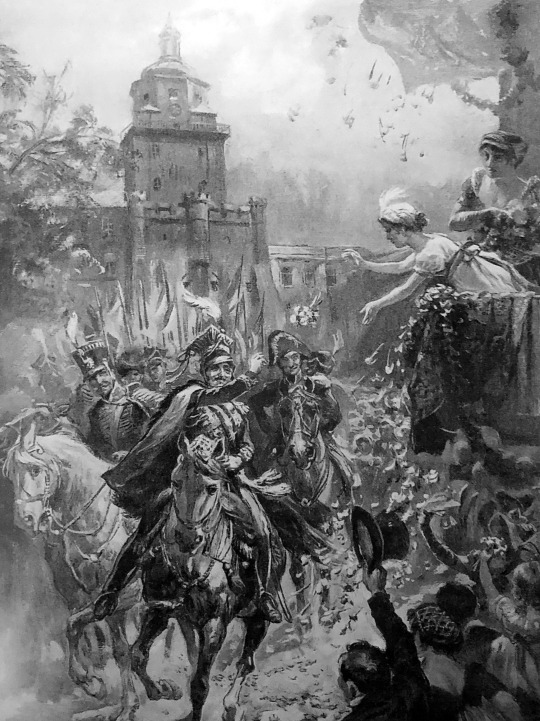
Konstanty Gorski, "Prince Józef Poniatowski enters conquered Lublin in 1809, showered with flowers by ladies"
As Kajetan Koźmian recalls in his memoirs, Poniatowski and his men were greeted with "joy and elation", and in the evening "... the city and the citizens gave a great ball <...> in the house in Korce. Prince Józef honored them with his presence starting the ball."
The next city on the way of the Polish Army was Sandomierz, and after a short siege it was taken on the 18th of May.

Siege of Sandomierz in 1809.
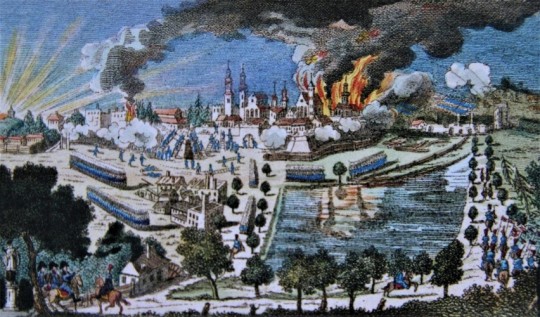
Michał Stachowicz, a scene from the battles in Galicia ("The Capture of Zamość")
Then there was Zamość, where the Polish trooped entered on the 20th of May.
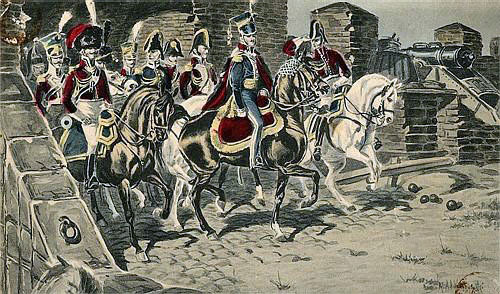
Siege of 1809, M. Adamczewski Entry of Prince Poniatowski to Zamość (postcard)
On the 27th of May the Polish advanced forces even reached the city of Lwów, but prince Józef wasn’t among them.
Meanwhile the Austrians under command Archduke Ferdinand realized the precariousness of their position in the center of Poland, and on the 1st of June left Warsaw for the south.
Poniatowski, for his part, decided not to engage with the Austrian, focusing instead on "liberating” as much Galician land as possible.
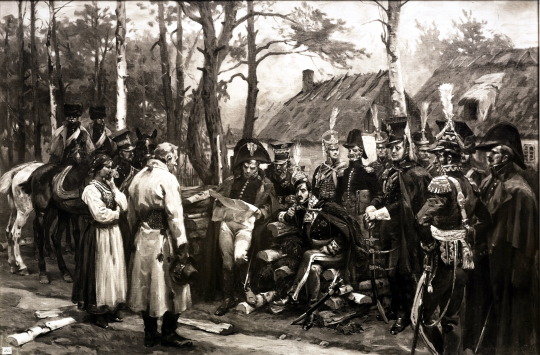
Prince Józef Poniatowski seeks information from local peasants in Galicia in 1809, a photo of Stanisław Bagieński's painting
On the 3rd June there appeared the third participant of the events - Russian forces crossed the Austrian border to Galicia as well. And though formally they were acting as Napoleon’s ally, as was prescribed in the Tilsit Treaty, their real goal was to prevent the Poles from taking too much of the Austrian-held territories.
So, to outwit the Russians prince Józef was taking Galician cities not in the name of the Duchy of Warsaw, but in the one of emperor of the Frenchmen. Like the proclamations were being made in the name of Napoleon, the eagles on the coats-of-arms replacing the Austrian ones were not Polish and French etc.
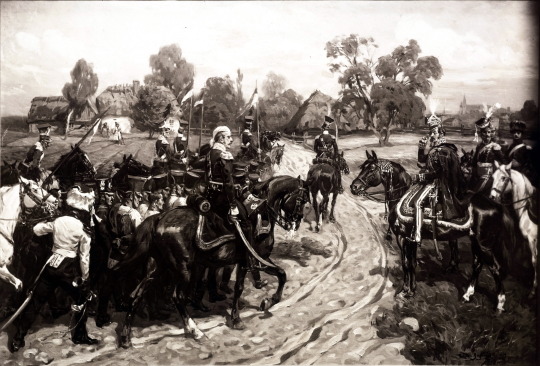
Lancers lead Austrian prisoners of war near Kraków in 1809, in front of Prince Józef Poniatowski, a photo of Stanisław Bagieński's painting
Then, in the outer theater of war on the 6th of July the French defeated the Austrians at the Battle of Wagram. And according Franco-Austrian truce signed five days later the land division was to take place along the line where the troops were at the time of receiving news of the truce, not at the time its signing.

The Austrian army leaves Wawel, a postcard based on the painting of Wojciech Kossak
And so began the race between Russians and Poles, to advance to as farther as possible.
In the middle of July both armies reached Kraków.

PRINCE JOSEPH'S ENTRY TO KRAKOW. A drawing by Jan Feliks Piwarski.
And there the clash of the interest took place.
Poniatowski approached the city from the side of St. Florian's Gate, but it turned out that the Austrians, wanting more comfortable terms of capitulation, had already let Russian troops into Kraków.
The Russians, namely the Cossacks of General Sievers, wanted to deny Poniatowski passage. But Prince Józef, as Dezydery Chłapowski recalls in his memoirs, "draw his broadsword and with together his staff galloped into the gate through the Cossacks". The Polish infantry followed its commander "in a double step <...> so that the Cossacks were pressed against the walls of the gate." Seeing this, Mariampol's hussar regiment, which was stationed at that time in the market square, make a decision to put up resistance and due to this, the whole Polish army was able to enter the city.

Michał Stachowicz, The entry of Prince Józef Poniatowski into Krakow on July 15, 1809
Then, as Ambroży Grabowski recalled, when prince Józef’s troops reached the market square, “in front of the church of St. Wojciech, the magistrate went out to meet the prince, to give him the keys of the city”.
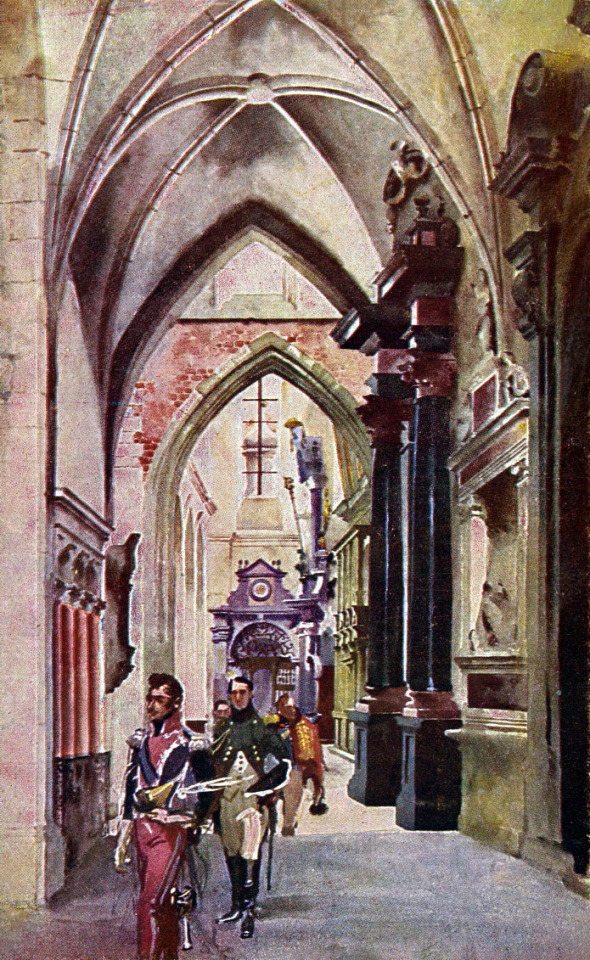
Józef Poniatowski in the Cathedral after Kraków was taken from the Austrians, an image by Stanisław Tondos and Wojciech Kossak
Most probably prince Józef visited the Wawel cathedral during his sojourn in Kraków that time. (In a small voice: little did he know that in 8 years he’ll be buried there...)
And after exactly a month since the Polish troops entered Kraków, there was a ball arranged in the Cloth-hall, the image depicting it I have already posted here.
#Poniatowski#Jozef Poniatowski#józef poniatowski#1809#Galicia#Lublin#Sandomierz#Zamość#Kraków#Austro-Polish War#Konstanty Gorski#Michał Stachowicz#Stanisław Bagieński#Wojciech Kossak#Feliks Piwarski#Kajetan Koźmian#Dezydery Chłapowski#ambroży grabowski
33 notes
·
View notes
Text
Events 4.19 (before 1940)
AD 65 – The freedman Milichus betrays Piso's plot to kill the Emperor Nero and all of the conspirators are arrested.
531 – Battle of Callinicum: A Byzantine army under Belisarius is defeated by the Persians at Raqqa (northern Syria).
1506 – The Lisbon Massacre begins, in which accused Jews are slaughtered by Portuguese Catholics.
1529 – Beginning of the Protestant Reformation: After the Second Diet of Speyer bans Lutheranism, a group of rulers (German: Fürst) and independent cities protests the reinstatement of the Edict of Worms.
1539 – The Treaty of Frankfurt between Protestants and the Holy Roman Emperor is signed.
1608 – In Ireland, O'Doherty's Rebellion is launched by the Burning of Derry.
1677 – The French army captures the town of Cambrai held by Spanish troops.
1713 – With no living male heirs, Charles VI, Holy Roman Emperor, issues the Pragmatic Sanction of 1713 to ensure that Habsburg lands and the Austrian throne would be inheritable by a female; his daughter and successor, Maria Theresa, was not born until 1717.
1770 – Captain James Cook, still holding the rank of lieutenant, sights the eastern coast of what is now Australia.
1770 – Marie Antoinette marries Louis XVI of France in a proxy wedding.
1775 – American Revolutionary War: The war begins with an American victory in Concord during the battles of Lexington and Concord.
1782 – John Adams secures Dutch recognition of the United States as an independent government. The house which he had purchased in The Hague becomes the first American embassy.
1809 – An Austrian corps is defeated by the forces of the Duchy of Warsaw in the Battle of Raszyn, part of the struggles of the Fifth Coalition. On the same day the Austrian main army is defeated by a First French Empire Corps led by Louis-Nicolas Davout at the Battle of Teugen-Hausen in Bavaria, part of a four-day campaign that ended in a French victory.
1810 – Venezuela achieves home rule: Vicente Emparán, Governor of the Captaincy General is removed by the people of Caracas and a junta is installed.
1818 – French physicist Augustin Fresnel signs his preliminary "Note on the Theory of Diffraction" (deposited on the following day). The document ends with what we now call the Fresnel integrals.
1839 – The Treaty of London establishes Belgium as a kingdom and guarantees its neutrality.
1861 – American Civil War: Baltimore riot of 1861: A pro-Secession mob in Baltimore attacks United States Army troops marching through the city.
1903 – The Kishinev pogrom in Kishinev (Bessarabia) begins, forcing tens of thousands of Jews to later seek refuge in Palestine and the Western world.
1927 – Mae West is sentenced to ten days in jail for obscenity for her play Sex.
1936 – The Jaffa riots commence, initiating the 1936–1939 Arab revolt in Palestine.
0 notes
Photo

Battle of Raszyn 1809 by Wojciech Kossak
6 notes
·
View notes
Text









Józef Poniatowski (1763-1813).
Marshal of France.
.
He was a Polish leader, general, minister of war and army chief, who became a Marshal of the French Empire.
.
A nephew of King Stanisław II Augustus, his military career began in 1780 in the Austrian army, where he attained the rank of a colonel. In 1789, after leaving the Austrian service, he joined the Polish army. Poniatowski, now in the rank of major general and commander of the Royal Guards, took part in the Polish–Russian War of 1792, leading the crown forces in Ukraine, where he fought a victorious battle of Zieleńce.
.
In 1794 he participated in the Kościuszko Uprising and was in charge of defending Warsaw for which he was subsequently exiled. In 1798 Poniatowski was permitted to return, however, he refused the offer to serve in the Imperial Russian army submitted to him by Tsar Alexander I.
.
In 1806, after the creation of the Duchy of Warsaw, he was appointed the minister of war. In 1809 he commanded a 16,000-strong army during the Austro-Polish War and achieved tactical success over a larger and more experienced Austrian force in the battle of Raszyn. The conflict ended with a Polish victory which allowed the Duchy to partially recover lands once lost in the Partitions of Poland.
.
A staunch ally and supporter of Napoleon I, Poniatowski voluntarily took part in the French invasion of Russia. He was injured during the fighting for Moscow which eventually forced his return to Warsaw, where he worked on the reconstruction of the Polish Armed Forces intended to fight in Germany. He was made Marshal of France during the battle of Leipzig ("Battle of Nations"). On the last day of the battle the wounded Marshal died in an attempt to cross the Elster River on horseback.
.
He had two sons with his two partners: Zelia Sitanska and Zofia Czosnowska. He also had a relationship with countess Marie-Scharlotte von Thun.
[Submission]
#history#beauty#historical babe#historical crush#historical hottie#history crush#history babe#history hottie#hottie#submission#19th century#jozef poniatowski#polish history
41 notes
·
View notes
Photo

Battle of Raszyn 1809 between Polish army and invading Austrians, by Wojciech Kossak [3000 x 1447] posted by Reddit User: falklanderpike Visit artofreddit.com for more art #battlepaintings
0 notes
Text
Events 4.19
AD 65 – The freedman Milichus betrays Piso's plot to kill the Emperor Nero and all the conspirators are arrested.
531 – Battle of Callinicum: A Byzantine army under Belisarius is defeated by the Persians at Raqqa (northern Syria).
797 – Empress Irene organizes a conspiracy against her son, the Byzantine emperor Constantine VI. He is deposed and blinded. Shortly after, Constantine dies of his wounds; Irene proclaims herself basileus.
1506 – The Lisbon Massacre begins, in which accused Jews are slaughtered by Portuguese Catholics.
1529 – Beginning of the Protestant Reformation: After the Second Diet of Speyer bans Lutheranism, a group of rulers (German: Fürst) and independent cities protests the reinstatement of the Edict of Worms.
1539 – The Treaty of Frankfurt between Protestants and the Holy Roman Emperor is signed.
1608 – In Ireland: O'Doherty's Rebellion is launched by the Burning of Derry.
1617 – The town of Uusikaupunki (Swedish: Nystad, lit. "New Town") is founded by King Gustavus Adolphus of Sweden.
1677 – The French army captures the town of Cambrai held by Spanish troops.
1713 – With no living male heirs, Charles VI, Holy Roman Emperor, issues the Pragmatic Sanction of 1713 to ensure that Habsburg lands and the Austrian throne would be inheritable by a female; his daughter and successor, Maria Theresa was not born until 1717.
1770 – Captain James Cook, still holding the rank of lieutenant, sights the eastern coast of what is now Australia.
1770 – Marie Antoinette marries Louis XVI of France in a proxy wedding.
1775 – American Revolutionary War: The war begins with an American victory in Concord during the battles of Lexington and Concord.
1782 – John Adams secures Dutch recognition of the United States as an independent government. The house which he had purchased in The Hague becomes the first American embassy.
1809 – An Austrian corps is defeated by the forces of the Duchy of Warsaw in the Battle of Raszyn, part of the struggles of the Fifth Coalition. On the same day the Austrian main army is defeated by a First French Empire Corps led by Louis-Nicolas Davout at the Battle of Teugen-Hausen in Bavaria, part of a four-day campaign that ended in a French victory.
1810 – Venezuela achieves home rule: Vicente Emparán, Governor of the Captaincy General is removed by the people of Caracas and a junta is installed.
1818 – French physicist Augustin Fresnel signs his preliminary "Note on the Theory of Diffraction" (deposited on the following day). The document ends with what we now call the Fresnel integrals.
1839 – The Treaty of London establishes Belgium as a kingdom and guarantees its neutrality.
1861 – American Civil War: Baltimore riot of 1861: A pro-Secession mob in Baltimore attacks United States Army troops marching through the city.
1903 – The Kishinev pogrom in Kishinev (Bessarabia) begins, forcing tens of thousands of Jews to later seek refuge in Palestine and the Western world.
1927 – Mae West is sentenced to ten days in jail for obscenity for her play Sex.
1942 – World War II: In German-occupied Poland, the Majdan-Tatarski ghetto is established, situated between the Lublin Ghetto and a Majdanek subcamp.
1943 – World War II: In German-occupied Poland, the Warsaw Ghetto Uprising begins, after German troops enter the Warsaw Ghetto to round up the remaining Jews.
1943 – Albert Hofmann deliberately doses himself with LSD for the first time, three days after having discovered its effects on April 16.
1956 – Actress Grace Kelly marries Prince Rainier of Monaco.
1960 – Students in South Korea hold a nationwide pro-democracy protest against president Syngman Rhee, eventually forcing him to resign.
1971 – Sierra Leone becomes a republic, and Siaka Stevens the president.
1971 – Launch of Salyut 1, the first space station.
1971 – Charles Manson is sentenced to death (later commuted to life imprisonment) for conspiracy in the Tate–LaBianca murders.
1973 – The Portuguese Socialist Party is founded in the German town of Bad Münstereifel.
1975 – India's first satellite Aryabhata launched in orbit from Kapustin Yar, Russia.
1975 – South Vietnamese forces withdrew from the town of Xuan Loc in the last major battle of the Vietnam War.
1984 – Advance Australia Fair is proclaimed as Australia's national anthem, and green and gold as the national colours.
1985 – Two hundred ATF and FBI agents lay siege to the compound of the white supremacist survivalist group The Covenant, the Sword, and the Arm of the Lord in Arkansas; the CSA surrenders two days later.
1987 – The Simpsons first appear as a series of shorts on The Tracey Ullman Show, first starting with "Good Night".
1989 – A gun turret explodes on the USS Iowa, killing 47 sailors.
1993 – The 51-day FBI siege of the Branch Davidian building in Waco, Texas, USA, ends when a fire breaks out. Seventy-six Davidians, including eighteen children under the age of ten, died in the fire.
1995 – Oklahoma City bombing: The Alfred P. Murrah Federal Building in Oklahoma City, USA, is bombed, killing 168 people including 19 children under the age of six.
1999 – The German Bundestag returns to Berlin.
2000 – Air Philippines Flight 541 crashes in Samal, Davao del Norte, killing all 131 people on board.
2005 – Cardinal Joseph Ratzinger is elected to the papacy and becomes Pope Benedict XVI.
2011 – Fidel Castro resigns as First Secretary of the Communist Party of Cuba after holding the title since July 1961.
2013 – Boston Marathon bombing suspect Tamerlan Tsarnaev is killed in a shootout with police. His brother Dzhokhar is later captured hiding in a boat inside a backyard in the suburb of Watertown.
2020 – A killing spree in Nova Scotia, Canada, leaves 22 people and the perpetrator dead, making it the deadliest rampage in the country's history.
2021 – The Ingenuity helicopter becomes the first aircraft to achieve flight on another planet.
0 notes
Text
Answers to the “Favourite Historical Figure: Ask Game”
About prince Józef Poniatowski, of course ;)
Because @josefavomjaaga and @tairin asked me kinda similar questions (4, 6 and 10 and 6 and 15) I decided to answer to both in one post.
And because I am a “perfectionist” and I like to illustrate my posts with images, it took me some time to prepare everything, that is why I am answering only now.
As for illustrations chosen - this time all of them are made by the Polish painter Bronisław Gembarzewski.
4. In your eyes, what is their biggest strength?
A little bit difficult question to answer, I have to admit. Because nowadays prince Józef is usually liked for his patriotism, and his contemporaries noted in him such virtues as kindness and braveness. (And for this he was especially loved by him inferiors - by soldiers.)
The feature of prince Józef’s character which, however, appeal to me most of all is his self-criticism. Because - judging by the correspondence, memoires about him etc which was left - if Poniatowski didn’t know something he would openly admit it. And never was prince Poniatowski arrogant, at meetings of the Council of Ministers, as Kajetan Koźmian recalled, when asked for opinion, he almost always started with these words: "I in my stupid sense think...", though the things with which prince Józef proceeded then were usually precise and clear.

Prince Józef’s in his study in Jabłonna palace.
6. In your opinion, what is their biggest flaw?
Oh, this one will be a little bit easy to answer. In his lifetime, especially before 1809, prince Józef was often accused of being too frivolous, of leading a life too merry, but from my point of view this is a kind of “features”, not flaws.
What really, in my opinion, might have bad influence on his life is that he, being a military commander, was often too indulgent towards those inferiors of him with whom he was in good terms. Remember, in one of the previous posts I wrote that after creation of the Duchy of Warsaw a lot of youth from the “Blacha’s people” joined the Army? Thus automatically becoming Poniatowski’s subordinates. And he continued with them like nothing happened, like the were still only friends of him. (In the case, for example, of jumping naked around the fire in 1809, about which general Fiszer complained, no one, in fact, was punished.)

Infantry regiment review in the courtyard of the palace "Pod Blachą".
10. What is your favourite quote by / about them?
Oh, to this one it will also be interesting to answer. The first phrase, which can into my mind, was Napoleon’s sentence from Saint-Helene, that “Poniatowski was the man which should have been made the king of Poland”. But knowing prince Józef’s reluctance this is not the case.
The second variant was a phrase attributed to him, supposedly pronounced just before his death: “God has entrusted me with the honor of the Poles, to him only I will only give it” (”Bóg mi powierzył honor Polaków, Bogu go tylko oddam”). But modern historians have a lot of doubts whether Poniatowski in fact said something like this, so this looks like to be a legend.
But there is another phrase, also attributed to prince Józef at Leipzig, it is shorter and it sounds much more probable - “Il faut mourir en brave” (We must die brave, one must die brave), and this is the quote I like most all.

The death of prince Józef in the battle of Nation at Leipzig
15. Describe them in one sentence
This, finally, will be very easy, because this kind of “slogan” came into my mind a couple of month ago, during a chat with one of my virtual friends, and is stuck there since then. “He wasn’t quick at setting his mind, but having set was faithful till the end.” Or just “faithful till the end”.

Prince Joseph gives the order to attack in the battle of Raszyn
And thanks a lot for asking!
#Poniatowski#józef poniatowski#bronisław gembarzewski#Battle of Raszyn#Battle of Leipzig#Jabłonna palace
30 notes
·
View notes
Text
Józef Poniatowski’s depiction in movies
Part I. Films not related to Napoleon-Walewska story
Good day to you all, dear friends, and let me (while I am on vacation) pick as the topic of this week’s post not very serious one. Namely - to show you actors who played prince Poniatowski in movies.
About half of the movies where prince Józef appears are, however, dedicated to Napoleon’s love affair with Maria Walewska - to them I dedicated the next post. Today let us look to another half.
1. The first movie in my list will be a Polish movie from 1937 named „Ułan księcia Józefa” („The Uhlan of Prince Joseph”), also known as “Dziewczyna i ułan” (“The girl and the uhlan”).
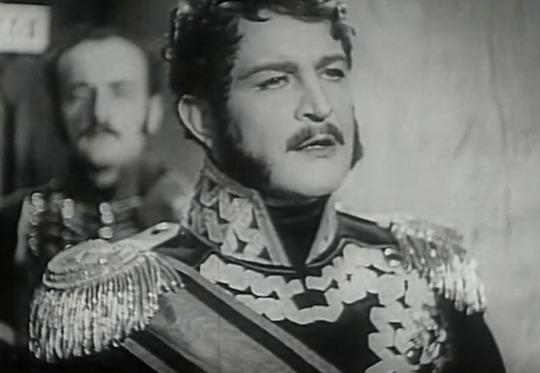
Franciszek Brodniewicz as prince Józef in The Uhlan of prince Józef
And, frankly speaking, this is my favorite movie from those where Pepi appears. Why? At least because it’s not about the war, it’s about love (though the girl here chooses the uhlan over prince Józef).
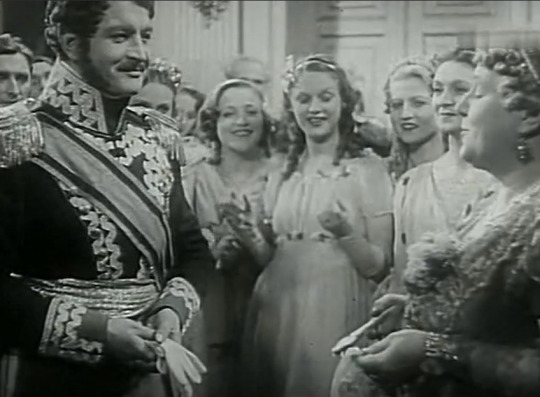
Prince Józef at the ball, with ladies
And also I liked very much how Franciszek Brodniewicz played Pepi. (And can’t understand, at all, how the heroine could give her heart to an uhlan, when Poniatowski was courting her)))
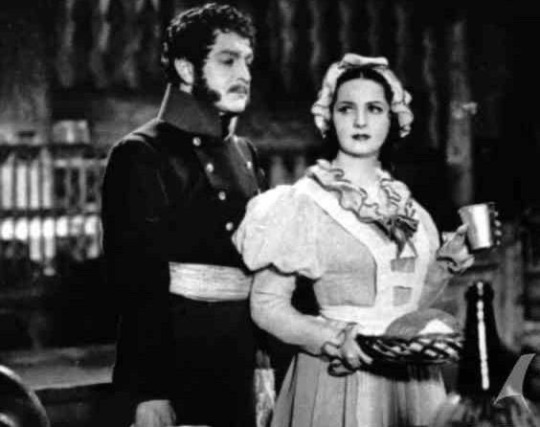
Franciszek Brodniewicz with Jadwiga Smosarska, who played the main heroine, Kasia.
For those who became interested in this film I am giving the link on Youtube (but it is in Polish and doesn’t have any subtitles, sorry).
2. The second from my list of non “Napoleon-Walewska”-related movies will be “Popioły” („The Ashes”) - Andrzej Wajda’s adaptation of Stefan Żeromski’s novel of the the same title. And though prince Józef was a minor of the book he appeared in movie, played by Stanisław Zaczyk.
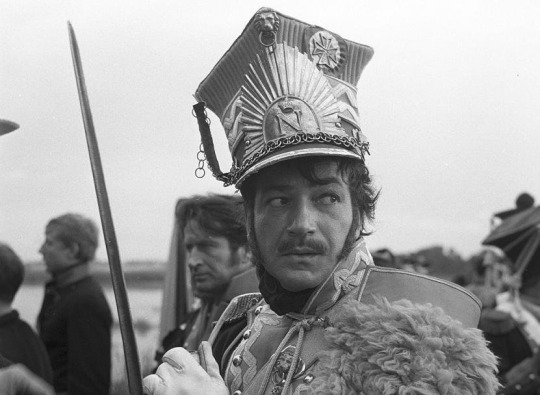
Prince Józef during the battle of Raszyn
What’s interesting is that 12 years after “The Ashes” were filmed Stanisław Zaczyk played Poniatowski one more time, that time in a docudrama “Raszyn. 1809” devoted to the battle itself. (Alas, I was able neither to watch this movie, nor to find any screen from it.)
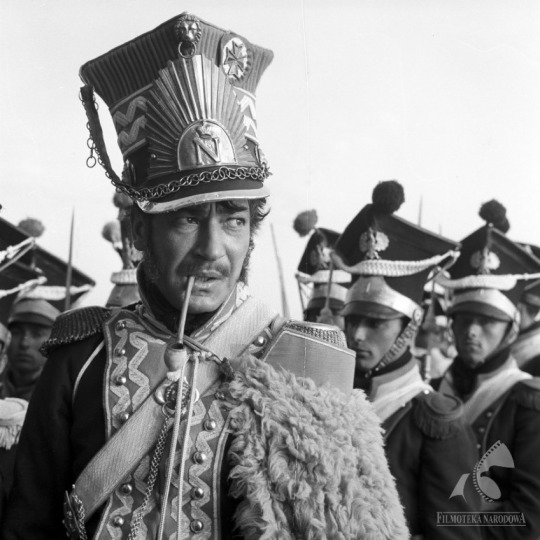
Stanisław Zaczyk as prince Józef in “The Ashes”
However, what is also interesting about the movie is that there we can see a “casual” Pepi - receiving visitors in a dressing gown:
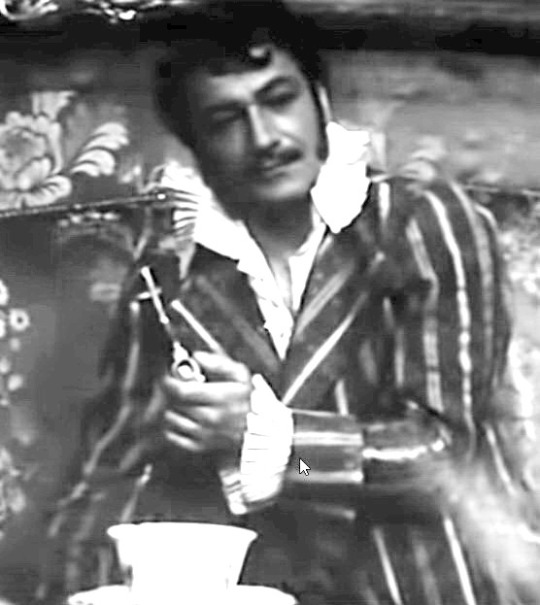
Screenshot from The Ashes
And for those, who are interested, there links to this film on TouTube:
Part I, Part II, Part III (in Polish, without subtitles again, sorry…)
3. The next position from my list is more actor’s choice, than the movie. But nevertheless, though the film under the name „Książę Józef Poniatowski” where the actor played Pepi did not survive, there are photos of the actor in make-up, so please meet Józef Węgrzyn as Józef Poniatowski:
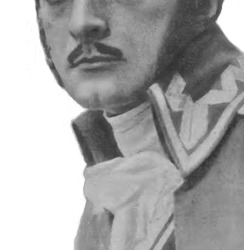
(But, I have to admit, I am not sure whether this is a photo from the film, or from the play of the same title which was written and staged in 1917, just a year before the film)
Nor I know the plot of the movie. But, judging by the fact that its director had the same surname as the play’s author (a brother?) is might have been an adaptation of the play.
And this is definitely a photo from the play (because it’s from a book with it):
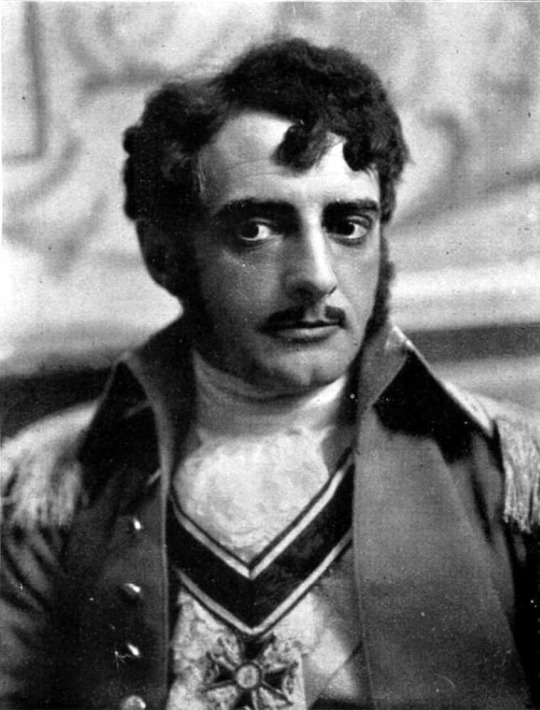
4. To finish this part I would also like with an actor. Who played… an actor playing prince Józef.
So please meet Marek Kondrat as “actor Marek playing Józef Poniatowski” in Juliusz Machulski’s film “V.I.P.”:
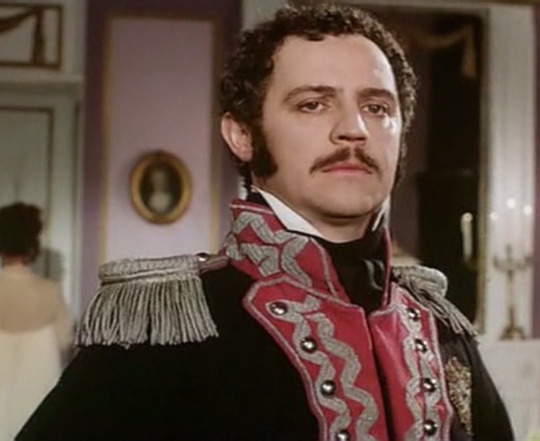
And one more screenshot, showing the “filming scene”:
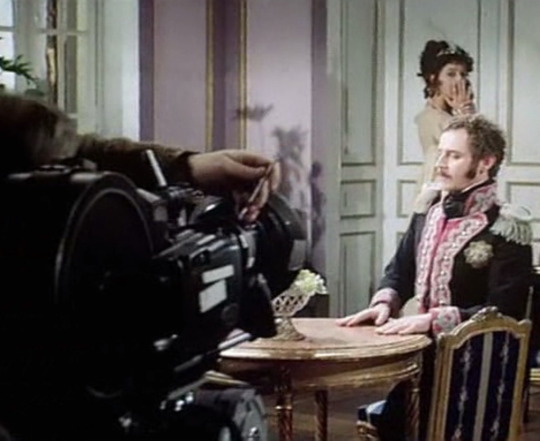
The whole movie (in Polish) can be watched on YouTube, here (the time is set approximately to the beginning of the scene).
#józef poniatowski#poniatowski#józef poniatowski in cinema#ułan księcia józefa#franciszek brodniewicz#popioły#stanisław zaczyk#książę józef poniatowski#józef węgrzyn#v.i.p.#marek kondrat
33 notes
·
View notes
Text
Contents of my blog (mainly devoted to prince Józef Poniatowski)
Some posts are re-blogs of my friends’ ones, for them the authors are given in brackets.

(The images added just to draw attention)
Portraits:
On paintings as a child
Painted during his lifetime
The most known posthumous (and its copies)
Other posthumous portraits
19th century “Photoshops”
Sculptures
Not looking like himself:
Engravings etc
With blue eyes
Family album:
Parents and sister
Grandparents, uncles and cousins
Some maternal relatives
Photoshops:
Napoleonic Christmas
Ofelia (by duc_du_orleans from Insta)
Riding naked on the streets of Warsaw
Women trying to seduce him
Relationships:
With women:
Karolina von Thun, Zelia Sitańska, Henriette de Vauban and Zofia Czosnoswka (first love, two mothers of his two sons and a French mistress older than him)
Julia Potocka, Rozalia Lubomirska, Barbara Kossowska (three ladies who tried to seduce him)
Princess Augusta of Saxony (a would-be bride that didn’t happen)
Pauline Bonaparte, Maria of Württemberg, Zofia Zamoyska (women with whom he might have had a kind of “romance”)
Queen Louise of Prussia, Anetka Potocka and the rest (of the names ever mentioned)
Why Poniatowski never married
Poniatowski’s children and descendants
With men:
Napoleon
Murat
Davout (a post of @histoireettralala)
Ligne, Schwarzenberg, Sanguszko, Linowski, Szumlański, Fiszer, Morand, Bignon (pals and comrades)
The Czartoryski family, Talleyrand
Dąbrowski, Zajączek, Sokolnicki, Jérôme Bonaparte (“frenemies”)
Prince Józef’s strong and weak points, quotes etc (a little bit about his personality)
His attitude towards becoming a king
A little bit on the topic of prince Józef’s height
Poniatowski’s favorite horse
Life events:
Place of birth, Vienna
Šabac, 1788
Zieleńce, 1792
Raszyn, 1809
Galician campaign, 1809
Narrow escape from the British Navy when visiting Gdańsk, 1810
Smolensk, 1812
———
Prince Józef’s last year:
Crossing the Berezina river, November 1812
Soldiers’ visit to the Copper-roofed palace, December 1812
Leaving Warsaw for good, February 1813
In Kraków, March-April-beginning of May 1813
Last evening in Kraków, May 1813
Entering Saxony, June 1813
Last summer and September, 1813
The battle of Leipzig, 16th-19th of October, 1813
———
Prince Poniatowski’s death in art
———
How Prince Józef’s body was found, 24th of October, 1813
Literature:
Fiction:
A manga by Riyoko Ikeda (a post by @tairin)
Poetry:
Poetry on the topic of his death
A short story on the topic about events behind his death (mine)
Depiction in movies and on stage:
“The uhlan of prince Joseph”, “The Ashes”, “Prince Józef Poniatowski” and “V.I.P”
Napoleon-Walewska related movies
“The Polish Thermopylae“ (a play)
Documentary videos on YouTube
——————————————————————
Books, magazines and other stuff related to Napoleonic era:
Magazines and some books
Books 1
Books 2
Books 3
Napoleonic era fiction
34 notes
·
View notes
Text
The Battle of Raszyn
Because today is the anniversary of the battle of Raszyn, which was fought on 19 April 1809 between armies of the Duchy of Warsaw under prince Józef Poniatowski and the Austrians under Archduke Ferdinand d’Este, I decided to show you some images on the topic.

1. The battle of Raszyn by Wojciech Kossak

2. An enlarged part of the previous image
(As the witnesses of the events recalled, one time, when the fighting was extremely hard on the Polish, prince Józef took a rifle from one of his interiors and went to battle on foot, as an ordinary soldier, thus giving an example to all his men.)

3. Poniatowski during the battle of Raszyn, by Wacław Franciszek Pawliszak

4. Juliusz Kossak The battle of Raszyn

5. Prince Józef Poniatowski with his staff on the dike of Falenty, by Wojciech Kossak

6. Prince Józef during the battle of Raszyn, by Stanislaw Haykowski

7. The battle of Raszyn by Aleksander Orłowski

8. Józef Ryszkiewicz, During the battle of Raszyn prince Józef lights a fuse of a cannon
(And it looks like prince Józef helped his artillery as well - though I do not remember this was mentioned in memoires of the battle’s participants)

9. Prince Józef holds a war council in the camp
As for the result of the battle - it ended in a kind of draw, because the Austrians did not make the Poles to leave their positions during the day.

10. January Suchodolski, The Battle of Raszyn
And though later the Polish commander-in-chief had to evacuate the army from the capital of the Duchy of Warsaw the result of the battle allowed him to make the truce with the enemy in the conditions convenient for him.
And thus, with the army saved, Poniatowski was able to move to the former Polish lands (known that time as the Austrian Galicia) and continue the campaign there. Which, in turn, eventually made the Polish win the war and incorporated into the Duchy a large piece of land.
#poniatowski #the battle of Raszyn
50 notes
·
View notes
Note
Hi ! Question about Józef Poniatowski: Did you know the Czartoryski family? What was your opinion that your sister was close to Charles de Talleyrand? Thanks.
Good evening, and thank you for your questions.
As for first one, about the Chartoryski’s family - of course prince Józef knew him.
Furthermore, they were a kind of relatives, because prince Jozef’s paternal grandmother, Konstancja, was born as a Czartoryska. (Which makes prince Adam Jerzy Czartoryski and his siblings Pepi’s secound cousins.)
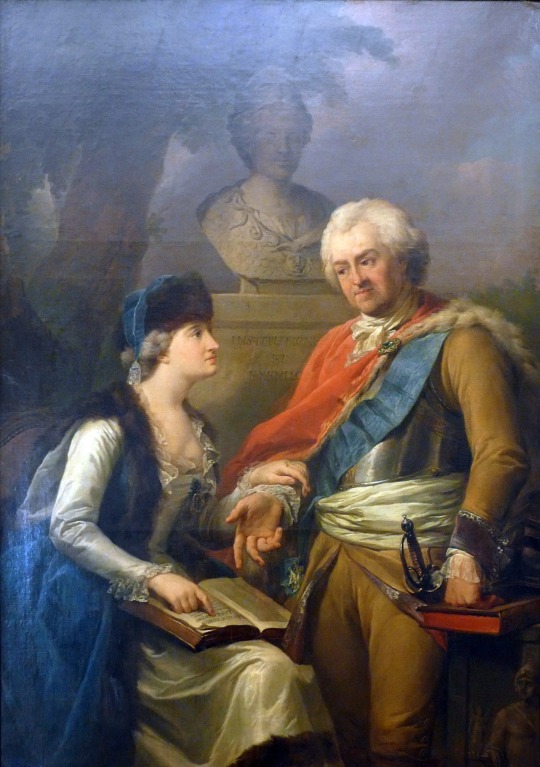
Portrait of Stanisław Poniatowski and his wife Konstancja Czartoryska, Marcello Bacciarelli, circa 1766-1771
Many times prince Józef visited the Czartorysku’s residence in Puławy. They most known episode, it looks like, was in 1809, when after the battle of Raszyn Poniatowski with his army went to Galicja. Though that time Puławy belonged yet to Austria, the princess Izabella and the prince Adam Kazimierz (Adam Jerzy’s parents) greeted Pepi very warmly. His soldiers were allowed to camp in the palace park…
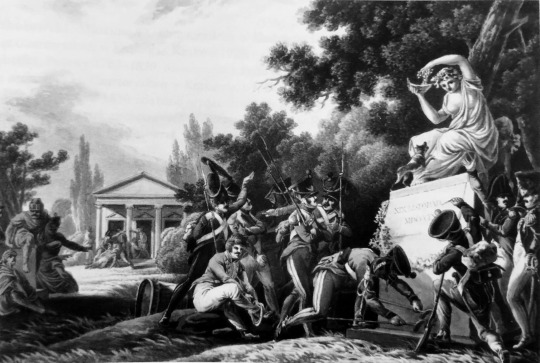
Polish soldiers, who were wounded in the battle of Sandomierz in 1809 and then treated in Puławy, leave the crutches they don’t need anymore, in Puławy’s park. An engraving made in the 19th century.
… and Pepi himself participated in the opening of the Gothic house, a garden pavilion built as additional spaces for the items of princess Izabela’s collection objects related to the Polish and European history.
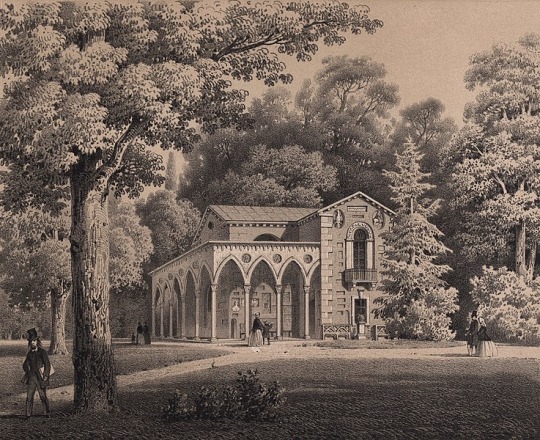
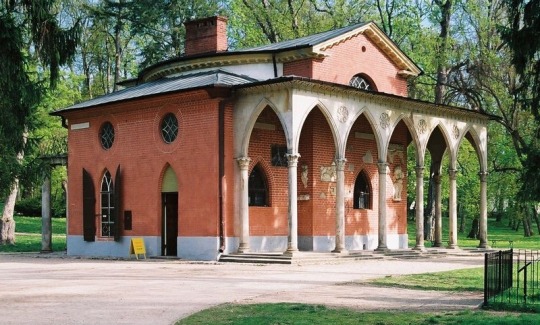
The Gothic house on the lithography made by Adam Lerue in 1858; and its modern photo
And after prince Józef’s heroic death princess Izabela gathered a collection of “souvenirs” related to him and exhibited them in another park pavilion, the Temple of Sibyl.
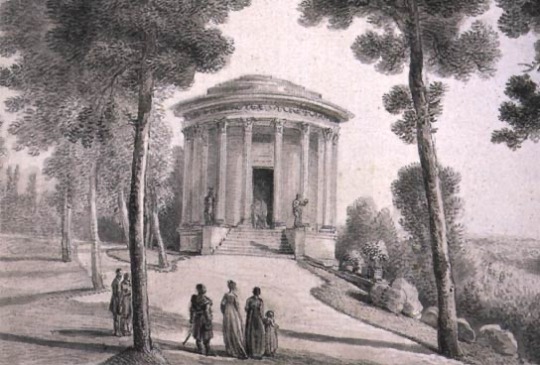

19th-century engraving of the Temple of the Sibyl, and a contemporary view.
Furthermore, on the ground floor of the Temple there was places an obelisk dedicated to prince Józef:

Unfortunately, this floor is open for visitors very rarely, so my photo was made through a window…
As for the youngest generation of the Chartoryskis - the closest of them to Pepi was, I think, Konstanty. He was a colonel of the Duchy of Warsaw since 1809 and accompanied prince Józef during his visit to Paris in 1811.
Speaking of the older brother, Adam Jerzy, I can recall that he was among those who tried to persuade (in correspondence) Poniatowski in 1813 to switch sides, to leave Napoleon and join Russians. (And also there was a concept named “Puławy’s plan” in 1805, about the resurrection of Poland under Russian protectorate. That time prince Adam also tried to persuade Poniatowski to join.)
Then the sisters… Zofia Zamoyska, née Czartoryska, was the latest person to give a party for prince Józef on the Polish soil. And happened this in May 1813 in Kraków, just a couple of days Pepi left his motherland for good. The older sister Maria also may have been present there. (And, you know, the names of Czartoryski’s sisters also appeared in a long list of women whom prince Poniatowski was attributed to have relationship with. So I promise to return to the topic one day )))
And now let’s move to the second of your questions, about prince Jozef’s sister’s relationship with Charles Maurice de Talleyrand.
Teresa was married to the count Wincenty Tyszkiewicz in 1778, when she turned 18. He was only 4 years older than her, but he was - as diarists recall - a kind of retard. And rather eccentric. (For example, he had a habit to wear female clothes at home.) And she was bright and high spirited, liked horses, hunting etc. So she became bored of the husband very quickly, and decided to leave him.
To obtain a divorce that time was… very complicated, but still possible. But Teresa and Jozef’s uncle, the king, did not allow his niece to start the process. So the spouses Tyszkiewiczs just separated. Teresa travelled in Europe, then settled with her brother and his mistress Henriette de Vauban in Warsaw. But, in contrast with Pepi, for the next 30 almost years after the separation no one man was ever mentioned as her love interest.
And then, with the arrival of Napoleon’s court in Warsaw there appeared French foreign minister. Charles Maurice de Talleyrand.
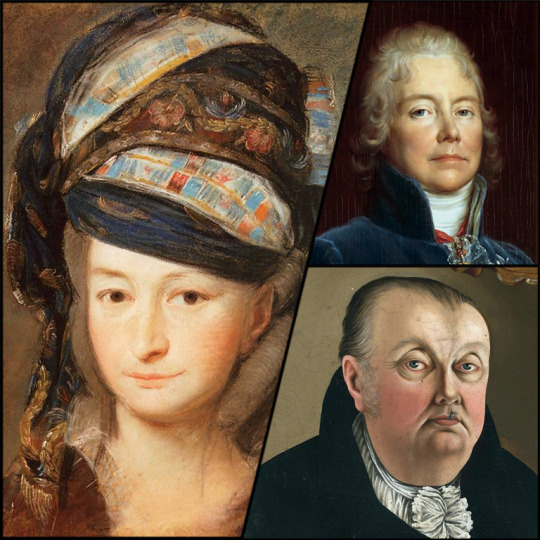
Left: Kazimierz Wojniakowski, the portrait of Maria Teresa Tyszkiewicz (née Poniatowski), circa 1797. Top right: François Gérard, The portrait of Charles Maurice de Talleyrand Périgord Prince de Bénévent, 1808. Bottom right: Jan Falęski, portrait of Wincenty Tyszkiewicz, 1814
That time Teresa was already more than 45 years old. And Talleyrand had seven yet more. And was married. And was… lame. (Their contemporaries jokes, that they made a strange couple - right leg lame man and one eyed woman. Because Teresa, being a teenager, lost her left eye in accident and since that time had to wear a glass one…)
But everything points that from the countess Tyszkiewicz’s side it was love, the real feeling. As for the prince of Bénévent - well, in the end of his life, when Teresa died, he lamented „the loss of his dear long-time friend” bitterly. But when everything started… she was definitely not the only one for him. (Among his love interests of that time there may be mentioned another Polish aristocrat, Izabela Sobolewska. And Anne-Charlotte-Dorothée, the Duchesse de Courlande. Who was later replaced with her daughter and namesake, who was the wife of… Talleyrand’s nephew Edmond.)
But let’s return to Teresa. When in 1807 Napoleon’s court returned to France, the countess Tyszkiewicz followed the man, who “stole her heart”. She settled in Paris, and visited Warsaw from only now and then. French diarists recall how she held small parties with card game in her house in the French capital, and always lended money for her beloved one when he was short of them. And he, though her feelings didn’t cause great enthusiasm in him, always accepted the money. (Btw, Teresa’s debts were so high, that when in 1811 Poniatowski was in Paris her creditors found him and made to pay.) But it looks like with the time passing Charles Maurice attitude to Teresa softened and he learned to value her. After she finally settled in France in 1820 they made several trips on the South of France together (though not without the company of Dorothea the younger). And the countess Tyszkiewicz even “acquired” her own room in Valençey, prince Talleyrand’s favorite residence. Where, by the way, both she (in 1834) and he (4 years later) are buried, just one near another.
And finally the answer to the question what was Pepi’s opinion on this relationship. Did he know about it? I think that yes. Because it was not a secret in that time’s high society. Did he disapprove? It looks like no. Because, for instance, when he came to Paris in 1811, the big reception on the occasion of his arrival was made, with Teresa’s help, in Talleyrand’s house. And the prince of Bénévent was among those (together with Murat etc) who introduced Poniatowski to Parisian high society.
Well, I hope this long-read did answer your questions (I am sorry, it looks like I am not able to write short posts on my favorite topics). But of not - you are always welcome to ask more )))
#józef poniatowski#charles maurice de talleyrand périgord#teresa tyszkiewicz#the Chartoryski’s family
23 notes
·
View notes
Text
Events 4.19
AD 65 – The freedman Milichus betrays Piso's plot to kill the Emperor Nero and all the conspirators are arrested.
531 – Battle of Callinicum: A Byzantine army under Belisarius is defeated by the Persians at Raqqa (northern Syria).
797 – Empress Irene organizes a conspiracy against her son, the Byzantine emperor Constantine VI. He is deposed and blinded. Shortly after, Constantine dies of his wounds; Irene proclaims herself basileus.
1506 – The Lisbon Massacre begins, in which accused Jews are slaughtered by Portuguese Catholics.
1529 – Beginning of the Protestant Reformation: After the Second Diet of Speyer bans Lutheranism, a group of rulers (German: Fürst) and independent cities protests the reinstatement of the Edict of Worms.
1539 – The Treaty of Frankfurt between Protestants and the Holy Roman Emperor is signed.
1608 – In Ireland: O'Doherty's Rebellion is launched by the Burning of Derry.
1617 – The town of Uusikaupunki (Swedish: Nystad, lit. "New Town") is founded by King Gustavus Adolphus of Sweden.
1677 – The French army captures the town of Cambrai held by Spanish troops.
1713 – With no living male heirs, Charles VI, Holy Roman Emperor, issues the Pragmatic Sanction of 1713 to ensure that Habsburg lands and the Austrian throne would be inheritable by a female; his daughter and successor, Maria Theresa was not born until 1717.
1770 – Captain James Cook, still holding the rank of lieutenant, sights the eastern coast of what is now Australia.
1770 – Marie Antoinette marries Louis XVI of France in a proxy wedding.
1775 – American Revolutionary War: The war begins with an American victory in Concord during the battles of Lexington and Concord.
1782 – John Adams secures Dutch recognition of the United States as an independent government. The house which he had purchased in The Hague becomes the first American embassy.
1809 – An Austrian corps is defeated by the forces of the Duchy of Warsaw in the Battle of Raszyn, part of the struggles of the Fifth Coalition. On the same day the Austrian main army is defeated by a First French Empire Corps led by Louis-Nicolas Davout at the Battle of Teugen-Hausen in Bavaria, part of a four-day campaign that ended in a French victory.
1810 – Venezuela achieves home rule: Vicente Emparán, Governor of the Captaincy General is removed by the people of Caracas and a junta is installed.
1818 – French physicist Augustin Fresnel signs his preliminary "Note on the Theory of Diffraction" (deposited on the following day). The document ends with what we now call the Fresnel integrals.
1839 – The Treaty of London establishes Belgium as a kingdom and guarantees its neutrality.
1861 – American Civil War: Baltimore riot of 1861: A pro-Secession mob in Baltimore attacks United States Army troops marching through the city.
1901–present
1903 – The Kishinev pogrom in Kishinev (Bessarabia) begins, forcing tens of thousands of Jews to later seek refuge in Palestine and the Western world.
1927 – Mae West is sentenced to ten days in jail for obscenity for her play Sex.
1942 – World War II: In German-occupied Poland, the Majdan-Tatarski ghetto is established, situated between the Lublin Ghetto and a Majdanek subcamp.
1943 – World War II: In German-occupied Poland, the Warsaw Ghetto Uprising begins, after German troops enter the Warsaw Ghetto to round up the remaining Jews.
1943 – Albert Hofmann deliberately doses himself with LSD for the first time, three days after having discovered its effects on April 16.
1956 – Actress Grace Kelly marries Prince Rainier of Monaco.
1960 – Students in South Korea hold a nationwide pro-democracy protest against president Syngman Rhee, eventually forcing him to resign.
1971 – Sierra Leone becomes a republic, and Siaka Stevens the president.
1971 – Launch of Salyut 1, the first space station.
1971 – Charles Manson is sentenced to death (later commuted to life imprisonment) for conspiracy in the Tate–LaBianca murders.
1973 – The Portuguese Socialist Party is founded in the German town of Bad Münstereifel.
1975 – India's first satellite Aryabhata launched in orbit from Kapustin Yar, Russia.
1975 – South Vietnamese forces withdrew from the town of Xuan Loc in the last major battle of the Vietnam War.
1984 – Advance Australia Fair is proclaimed as Australia's national anthem, and green and gold as the national colours.
1985 – Two hundred ATF and FBI agents lay siege to the compound of the white supremacist survivalist group The Covenant, the Sword, and the Arm of the Lord in Arkansas; the CSA surrenders two days later.
1987 – The Simpsons first appear as a series of shorts on The Tracey Ullman Show, first starting with "Good Night".
1989 – A gun turret explodes on the USS Iowa, killing 47 sailors.
1993 – The 51-day FBI siege of the Branch Davidian building in Waco, Texas, USA, ends when a fire breaks out. Seventy-six Davidians, including eighteen children under the age of ten, died in the fire.
1995 – Oklahoma City bombing: The Alfred P. Murrah Federal Building in Oklahoma City, USA, is bombed, killing 168 people including 19 children under the age of six.
1999 – The German Bundestag returns to Berlin.
2000 – Air Philippines Flight 541 crashes in Samal, Davao del Norte, killing all 131 people on board.
2005 – Cardinal Joseph Ratzinger is elected to the papacy and becomes Pope Benedict XVI.
2011 – Fidel Castro resigns as First Secretary of the Communist Party of Cuba after holding the title since July 1961.
2013 – Boston Marathon bombing suspect Tamerlan Tsarnaev is killed in a shootout with police. His brother Dzhokhar is later captured hiding in a boat inside a backyard in the suburb of Watertown.
2020 – A killing spree in Nova Scotia, Canada, leaves 22 people and the perpetrator dead, making it the deadliest rampage in the country's history.
2021 – The Ingenuity helicopter becomes the first aircraft to achieve flight on another planet.
0 notes
Text
Events 4.19
AD 65 – The freedman Milichus betrays Piso's plot to kill the Emperor Nero and all the conspirators are arrested.
531 – Battle of Callinicum: A Byzantine army under Belisarius is defeated by the Persians at Raqqa (northern Syria).
797 – Empress Irene organizes a conspiracy against her son, the Byzantine emperor Constantine VI. He is deposed and blinded. Shortly after, Constantine dies of his wounds; Irene proclaims herself basileus.
1506 – The Lisbon Massacre begins, in which accused Jews are being slaughtered by Portuguese Catholics.
1529 – Beginning of the Protestant Reformation: After the Second Diet of Speyer bans Lutheranism, a group of rulers (German: Fürst) and independent cities protests the reinstatement of the Edict of Worms.
1539 – The Treaty of Frankfurt between Protestants and the Holy Roman Emperor is signed.
1608 – In Ireland: O'Doherty's Rebellion is launched by the Burning of Derry.
1677 – The French army captures the town of Cambrai held by Spanish troops.
1713 – With no living male heirs, Charles VI, Holy Roman Emperor, issues the Pragmatic Sanction of 1713 to ensure that Habsburg lands and the Austrian throne would be inheritable by a female; his daughter and successor, Maria Theresa was not born until 1717.
1770 – Captain James Cook, still holding the rank of lieutenant, sights the eastern coast of what is now Australia.
1770 – Marie Antoinette marries Louis XVI of France in a proxy wedding.
1775 – American Revolutionary War: The war begins with an American victory in Concord during the battles of Lexington and Concord.
1782 – John Adams secures Dutch recognition of the United States as an independent government. The house which he had purchased in The Hague becomes the first American embassy.
1809 – An Austrian corps is defeated by the forces of the Duchy of Warsaw in the Battle of Raszyn, part of the struggles of the Fifth Coalition. On the same day the Austrian main army is defeated by a First French Empire Corps led by Louis-Nicolas Davout at the Battle of Teugen-Hausen in Bavaria, part of a four-day campaign that ended in a French victory.
1810 – Venezuela achieves home rule: Vicente Emparán, Governor of the Captaincy General is removed by the people of Caracas and a junta is installed.
1818 – French physicist Augustin Fresnel signs his preliminary "Note on the Theory of Diffraction" (deposited on the following day). The document ends with what we now call the Fresnel integrals.
1839 – The Treaty of London establishes Belgium as a kingdom and guarantees its neutrality.
1861 – American Civil War: Baltimore riot of 1861: A pro-Secession mob in Baltimore attacks United States Army troops marching through the city.
1903 – The Kishinev pogrom in Kishinev (Bessarabia) begins, forcing tens of thousands of Jews to later seek refuge in Palestine and the Western world.
1927 – Mae West is sentenced to ten days in jail for obscenity for her play Sex.
1942 – World War II: In German-occupied Poland, the Majdan-Tatarski ghetto is established, situated between the Lublin Ghetto and a Majdanek subcamp.
1943 – World War II: In German-occupied Poland, the Warsaw Ghetto Uprising begins, after German troops enter the Warsaw Ghetto to round up the remaining Jews.
1943 – Albert Hofmann deliberately doses himself with LSD for the first time, three days after having discovered its effects on April 16.
1956 – Actress Grace Kelly marries Prince Rainier of Monaco.
1960 – Students in South Korea hold a nationwide pro-democracy protest against president Syngman Rhee, eventually forcing him to resign.
1971 – Sierra Leone becomes a republic, and Siaka Stevens the president.
1971 – Launch of Salyut 1, the first space station.
1971 – Charles Manson is sentenced to death (later commuted to life imprisonment) for conspiracy in the Tate–LaBianca murders.
1973 – The Portuguese Socialist Party is founded in the German town of Bad Münstereifel.
1975 – India's first satellite Aryabhata launched in orbit from Kapustin Yar, Russia.
1975 – South Vietnamese forces withdrew from the town of Xuan Loc in the last major battle of the Vietnam War.
1984 – Advance Australia Fair is proclaimed as Australia's national anthem, and green and gold as the national colours.
1985 – Two hundred ATF and FBI agents lay siege to the compound of the white supremacist survivalist group The Covenant, The Sword, and the Arm of the Lord in Arkansas; the CSA surrenders two days later.
1987 – The Simpsons first appear as a series of shorts on The Tracey Ullman Show, first starting with "Good Night".
1989 – A gun turret explodes on the USS Iowa, killing 47 sailors.
1993 – The 51-day FBI siege of the Branch Davidian building in Waco, Texas, USA, ends when a fire breaks out. 76 Davidians, including eighteen children under the age of ten, died in the fire.
1995 – Oklahoma City bombing: The Alfred P. Murrah Federal Building in Oklahoma City, USA, is bombed, killing 168 people including 19 children under the age of six.
1999 – The German Bundestag returns to Berlin.
2000 – Air Philippines Flight 541 crashes in Samal, Davao del Norte, killing all 131 people on board.
2005 – Cardinal Joseph Ratzinger is elected to the papacy and becomes Pope Benedict XVI.
2011 – Fidel Castro resigns as First Secretary of the Communist Party of Cuba after holding the title since July 1961.
2013 – Boston Marathon bombing suspect Tamerlan Tsarnaev is killed in a shootout with police. His brother Dzhokhar is later captured hiding in a boat inside a backyard in the suburb of Watertown.
2020 – A killing spree in Nova Scotia, Canada, leaves 22 people and the perpetrator dead, making it the deadliest rampage in the country's history.
2021 – Ingenuity helicopter achieves the first flight on another planet in history.
0 notes
Photo

Battle of Raszyn 1809 between Polish army and invading Austrians, by Wojciech Kossak [3000 x 1447] posted by Reddit User: falklanderpike Visit artofreddit.com for more art #battlepaintings
0 notes
Text
Events 4.19
AD 65 – The freedman Milichus betrays Piso's plot to kill the Emperor Nero and all the conspirators are arrested.
531 – Battle of Callinicum: A Byzantine army under Belisarius is defeated by the Persians at Raqqa (northern Syria).
797 – Empress Irene organizes a conspiracy against her son, the Byzantine emperor Constantine VI. He is deposed and blinded. Shortly after, Constantine dies of his wounds; Irene proclaims herself basileus.
1506 – The Lisbon Massacre begins, in which accused Jews are being slaughtered by Portuguese Catholics.
1529 – Beginning of the Protestant Reformation: After the Second Diet of Speyer bans Lutheranism, a group of rulers (German: Fürst) and independent cities protests the reinstatement of the Edict of Worms.
1539 – The Treaty of Frankfurt between Protestants and the Holy Roman Emperor is signed.
1608 – In Ireland: O'Doherty's Rebellion is launched by the Burning of Derry.
1677 – The French army captures the town of Cambrai held by Spanish troops.
1713 – With no living male heirs, Charles VI, Holy Roman Emperor, issues the Pragmatic Sanction of 1713 to ensure that Habsburg lands and the Austrian throne would be inheritable by a female; his daughter and successor, Maria Theresa was not born until 1717.
1770 – Captain James Cook, still holding the rank of lieutenant, sights the eastern coast of what is now Australia.
1770 – Marie Antoinette marries Louis XVI of France in a proxy wedding.
1775 – American Revolutionary War: The war begins with an American victory in Concord during the battles of Lexington and Concord.
1782 – John Adams secures the Dutch Republic's recognition of the United States as an independent government. The house which he had purchased in The Hague, Netherlands becomes the first American embassy.
1809 – An Austrian corps is defeated by the forces of the Duchy of Warsaw in the Battle of Raszyn, part of the struggles of the Fifth Coalition. On the same day the Austrian main army is defeated by a First French Empire Corps led by Louis-Nicolas Davout at the Battle of Teugen-Hausen in Bavaria, part of a four-day campaign that ended in a French victory.
1810 – Venezuela achieves home rule: Vicente Emparán, Governor of the Captaincy General is removed by the people of Caracas and a junta is installed.
1818 – French physicist Augustin Fresnel signs his preliminary "Note on the Theory of Diffraction" (deposited on the following day). The document ends with what we now call the Fresnel integrals.
1839 – The Treaty of London establishes Belgium as a kingdom and guarantees its neutrality.
1861 – American Civil War: Baltimore riot of 1861: A pro-Secession mob in Baltimore attacks United States Army troops marching through the city.
1903 – The Kishinev pogrom in Kishinev (Bessarabia) begins, forcing tens of thousands of Jews to later seek refuge in Palestine and the Western world.
1927 – Mae West is sentenced to ten days in jail for obscenity for her play Sex.
1942 – World War II: In Poland, the Majdan-Tatarski ghetto is established, situated between the Lublin Ghetto and a Majdanek subcamp.
1943 – World War II: In Poland, the Warsaw Ghetto Uprising begins, after German troops enter the Warsaw Ghetto to round up the remaining Jews.
1943 – Albert Hofmann deliberately doses himself with LSD for the first time, three days after having discovered its effects on April 16.
1956 – Actress Grace Kelly marries Prince Rainier of Monaco.
1960 – Students in South Korea hold a nationwide pro-democracy protest against president Syngman Rhee, eventually forcing him to resign.
1971 – Sierra Leone becomes a republic, and Siaka Stevens the president.
1971 – Launch of Salyut 1, the first space station.
1971 – Charles Manson is sentenced to death (later commuted to life imprisonment) for conspiracy in the Tate–LaBianca murders.
1973 – The Portuguese Socialist Party is founded in the German town of Bad Münstereifel.
1975 – India's first satellite Aryabhata launched in orbit from Kapustin Yar, Russia.
1984 – Advance Australia Fair is proclaimed as Australia's national anthem, and green and gold as the national colours.
1985 – Two hundred ATF and FBI agents lay siege to the compound of the white supremacist survivalist group The Covenant, The Sword, and the Arm of the Lord in Arkansas; the CSA surrenders two days later.
1987 – The Simpsons first appear as a series of shorts on The Tracey Ullman Show, first starting with Good Night.
1989 – A gun turret explodes on the USS Iowa, killing 47 sailors.
1993 – The 51-day FBI siege of the Branch Davidian building in Waco, Texas, USA, ends when a fire breaks out. 76 Davidians, including eighteen children under the age of ten, died in the fire.
1995 – Oklahoma City bombing: The Alfred P. Murrah Federal Building in Oklahoma City, USA, is bombed, killing 168 people including 19 children under the age of six.
1999 – The German Bundestag returns to Berlin.
2000 – Air Philippines Flight 541 crashes in Samal, Davao del Norte, killing all 131 people on board.
2005 – Cardinal Joseph Ratzinger is elected to the papacy and becomes Pope Benedict XVI.
2011 – Fidel Castro resigns as First Secretary of the Communist Party of Cuba after holding the title since July 1961.
2013 – Boston Marathon bombing suspect Tamerlan Tsarnaev is killed in a shootout with police. His brother Dzhokhar is later captured hiding in a boat inside a backyard in the suburb of Watertown.
0 notes
Text
Events 4.19
AD 65 – The freedman Milichus betrays Piso's plot to kill the Emperor Nero and all the conspirators are arrested.
531 – Battle of Callinicum: A Byzantine army under Belisarius is defeated by the Persians at Raqqa (northern Syria).
797 – Empress Irene organizes a conspiracy against her son, the Byzantine emperor Constantine VI. He is deposed and blinded. Shortly after, Constantine dies of his wounds; Irene proclaims herself basileus.
1012 – Martyrdom of Ælfheah in Greenwich, England.
1506 – The Lisbon Massacre begins, in which accused Jews are being slaughtered by Portuguese Catholics.
1529 – Beginning of the Protestant Reformation: After the Second Diet of Speyer bans Lutheranism, a group of rulers (German: Fürst) and independent cities protests the reinstatement of the Edict of Worms.
1539 – Treaty of Frankfurt signed.
1608 – In Ireland: O'Doherty's Rebellion is launched by the Burning of Derry.
1677 – The French army captures the town of Cambrai held by Spanish troops.
1713 – With no living male heirs, Charles VI, Holy Roman Emperor, issues the Pragmatic Sanction of 1713 to ensure that Habsburg lands and the Austrian throne would be inheritable by a female; his daughter and successor, Maria Theresa was not actually born until 1717.
1770 – Captain James Cook, still holding the rank of lieutenant, sights the eastern coast of what is now Australia.
1770 – Marie Antoinette marries Louis XVI of France in a proxy wedding.
1775 – American Revolutionary War: The war begins with an American victory in Concord during the battles of Lexington and Concord.
1782 – John Adams secures the Dutch Republic's recognition of the United States as an independent government. The house which he had purchased in The Hague, Netherlands becomes the first American embassy.
1809 – An Austrian corps is defeated by the forces of the Duchy of Warsaw in the Battle of Raszyn, part of the struggles of the Fifth Coalition. On the same day the Austrian main army is defeated by a First French Empire Corps led by Louis-Nicolas Davout at the Battle of Teugen-Hausen in Bavaria, part of a four-day campaign that ended in a French victory.
1810 – Venezuela achieves home rule: Vicente Emparán, Governor of the Captaincy General is removed by the people of Caracas and a junta is installed.
1818 – French physicist Augustin Fresnel signs his preliminary "Note on the Theory of Diffraction" (deposited on the following day). The document ends with what we now call the Fresnel integrals.
1839 – The Treaty of London establishes Belgium as a kingdom and guarantees its neutrality.
1861 – American Civil War: Baltimore riot of 1861: A pro-Secession mob in Baltimore attacks United States Army troops marching through the city.
1903 – The Kishinev pogrom in Kishinev (Bessarabia) begins, forcing tens of thousands of Jews to later seek refuge in Palestine and the Western world.
1927 – Mae West is sentenced to ten days in jail for obscenity for her play Sex.
1942 – World War II: In Poland, the Majdan-Tatarski ghetto is established, situated between the Lublin Ghetto and a Majdanek subcamp.
1943 – World War II: In Poland, the Warsaw Ghetto Uprising begins, after German troops enter the Warsaw Ghetto to round up the remaining Jews.
1943 – Albert Hofmann deliberately doses himself with LSD for the first time, three days after having discovered its effects on April 16.
1956 – Actress Grace Kelly marries Prince Rainier of Monaco.
1960 – Students in South Korea hold a nationwide pro-democracy protest against president Syngman Rhee, eventually forcing him to resign.
1971 – Sierra Leone becomes a republic, and Siaka Stevens the president.
1971 – Launch of Salyut 1, the first space station.
1971 – Charles Manson is sentenced to death (later commuted to life imprisonment) for conspiracy in the Tate–LaBianca murders.
1973 – The Portuguese Socialist Party is founded in the German town of Bad Münstereifel.
1975 – India's first satellite Aryabhata launched in orbit from Kapustin Yar, Russia.
1984 – Advance Australia Fair is proclaimed as Australia's national anthem, and green and gold as the national colours.
1985 – Two hundred ATF and FBI agents lay siege to the compound of the white supremacist survivalist group The Covenant, The Sword, and the Arm of the Lord in Arkansas; the CSA surrenders two days later.
1987 – The Simpsons first appear as a series of shorts on The Tracey Ullman Show, first starting with Good Night.
1989 – A gun turret explodes on the USS Iowa, killing 47 sailors.
1993 – The 51-day FBI siege of the Branch Davidian building in Waco, Texas, USA, ends when a fire breaks out. 76 Davidians, including eighteen children under the age of ten, died in the fire.
1995 – Oklahoma City bombing: The Alfred P. Murrah Federal Building in Oklahoma City, USA, is bombed, killing 168 people including 19 children under the age of six.
1999 – The German Bundestag returns to Berlin.
2000 – Air Philippines Flight 541 crashes in Samal, Davao del Norte, killing all 131 people on board.
2005 – Cardinal Joseph Ratzinger is elected to the papacy and becomes Pope Benedict XVI.
2011 – Fidel Castro resigns as First Secretary of the Communist Party of Cuba after holding the title since July 1961.
2013 – Boston Marathon bombing suspect Tamerlan Tsarnaev is killed in a shootout with police. His brother Dzhokhar is later captured hiding in a boat inside a backyard in the suburb of Watertown.
0 notes